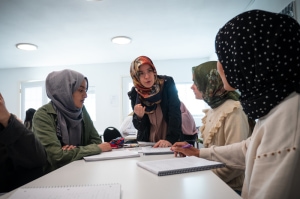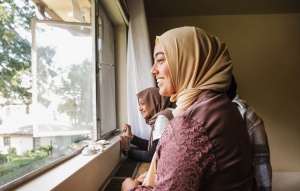Our Vision
“Muslims have always endeavored to be good stewards of the earth and pioneers in food production. Join us as we endeavor to revive that aspect of our glorious past.”
–– Imam Zaid Shakir, Professor Emeritus
The Zaytuna College Center for Ethical Living and Learning (ZCELL) aims to help revive and popularize ways of life which conform to prophetic ethical standards, and raise human consciousness to the levels needed to actualize the God-given role of humans as the vicegerents of God on earth. ZCELL was made possible by a generous donation from the Islamic Food and Nutrition Council of America (IFANCA), allowing us to expand our permaculture garden of fruits and vegetables to feed our students, staff, and faculty.
Our Mission
Our mission is to raise public awareness about sustainable models of food production, gardening, and community engagement, guided by the ethical ideals and practices introduced through prophetic teachings, Islamic tradition, and native wisdom. To promote alternative models of thinking and practice, we engage with academics, public intellectuals, and activists who are closely attuned to grassroots realities. We offer courses and classes incorporating experiential learning and maintain an ongoing permaculture operation spanning over 13,000 square feet.
The Zaytuna College Center for Ethical Living and Learning provides direct services to our college, our community, and a global audience. Our services include academic initiatives, workshops and seminars, experiential learning programs, and sustainable practices. Rhamis Kent is currently the Scholar in Residence at the Center for Ethical Living and Learning.
The Zaytuna College Center for Ethical Living and Learning is a 501(c)3 nonprofit entity registered as an auxiliary organization of Zaytuna College.
Sustain ZCELL
Your support will help sustain our operations, enhance our facilities, and broaden our reach to those interested in regenerative agriculture. Whether you choose to adopt a tree, bed cluster, or bee hives, or support our educational initiatives, your funds will steward these resources, which we hope, in sha Allah, will serve as a form of sadaqah jariyah (ongoing charity) for you.
By supporting the Zaytuna Center for Ethical Living and Learning, you join a community dedicated to compassionate stewardship and responsible care for the Earth and people. Thank you for considering this opportunity to make a meaningful impact.
What We Do
ZCELL works with a network of scholars to engage in curricula development and produce materials suitable for high schools, colleges, universities, and special seminars. The focal point of the curricula is explaining the flaws and destructiveness of current systems of production and patterns of consumption, and proposing an alternative system rooted in moral values informed by the ethical standards of divine law. The initiative also involves experimental farms where Permaculture and other alternative farming methods are taught, including urban gardening and natural methods of animal husbandry.
The center offers experiential learning opportunities through events, workshops, and Permaculture Design Certificate courses.
Our Sustainable Operations
Sustainable Practices
As a center that prides itself on ethical ideals and educating communities on the topics of prophetic ethical standards, sustainable living, and halal/tayyib lifestyles, we strive to be the paragon of what we preach. Our goal is to minimize campus-wide energy and material waste at Zaytuna College, and create a campus sustainability program modeled after leading global college and university sustainability initiatives.
Permaculture Garden
The Zaytuna College Permaculture Garden, located at our Upper Campus at 2770 Marin Ave. in Berkeley, CA, provides a source of sustenance through food production, as well as a source of education through courses, maintenance, and student participation. Our Permaculture Garden can be enjoyed by students and visitors alike.
Permaculture Design
As our center is a relatively new initiative at Zaytuna College, we are working closely with some of the top scholars and consultants in the field of Permaculture to build a garden that will benefit our college, our center, and our community for years to come. Exercises offered in our bi-annual Permaculture Design Certification course, such as composting, provide us with rich soil, which is the foundation of our garden. Sustainable composting practices and gray-water irrigation methods will help us minimize both our waste and carbon footprint.



